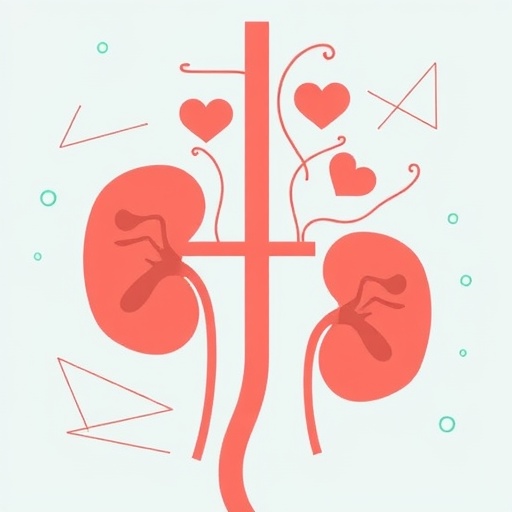In an era where healthcare systems are continually evolving, a recent study underscores the pivotal role of health literacy, particularly in managing chronic conditions such as chronic kidney disease (CKD). Authored by Nicholas Travis and M. R. Saunders, this compelling work titled “Investing in Understanding: The Economic Imperative of Health Literacy in Chronic Kidney Disease,” published in the Journal of General Internal Medicine, offers invaluable insights into how enhancing health literacy could fundamentally transform patient outcomes and healthcare costs.
Chronic kidney disease is a significant public health issue, affecting millions globally and often leading to severe complications, including kidney failure. Despite the advancements in medical technology and therapeutic approaches, the burden of CKD remains largely due to gaps in patients’ understanding of their health conditions. This deficiency is not just about acquiring knowledge; it is about the ability of patients to navigate the complexities of their health management. Addressing these knowledge gaps can yield substantial economic benefits for healthcare systems.
The authors argue that investing in health literacy is not simply a moral obligation but an economic imperative. When patients are equipped with the right knowledge tools, they are more likely to adhere to treatment protocols, adopt healthier lifestyle changes, and engage effectively with healthcare providers. This proactive engagement leads to better disease management, reduced hospitalization rates, and ultimately lower healthcare costs. In a time when healthcare expenditures are rising, such investments could represent a significant financial return for healthcare systems struggling to balance budgets.
One of the key findings highlighted in the study revolves around the relationship between health literacy and patient outcomes. Patients with higher health literacy are more proficient at understanding their conditions, which empowers them to make informed decisions regarding their treatment options. This empowerment not only enhances quality of life but also promotes a more collaborative relationship between patients and healthcare providers. The authors emphasize that fostering this collaboration is essential for effective CKD management, especially as the healthcare landscape becomes increasingly patient-centered.
Moreover, the implications of this research extend beyond individual patients to entire populations. The study highlights that improving health literacy can serve as a public health strategy to combat chronic diseases effectively. By recognizing the disparities in health literacy across different demographics, policymakers can tailor interventions to meet the needs of various community segments. This tailored approach is crucial, as it enables healthcare systems to break down barriers that often prevent equitable access to care.
Another critical dimension discussed in the article pertains to the educational interventions necessary for improving health literacy. The authors propose that healthcare systems should implement comprehensive educational programs aimed at both patients and healthcare professionals. These programs should focus on simplifying medical information, enhancing communication skills, and providing resources that are culturally sensitive and accessible. By doing so, healthcare providers can foster a more inclusive environment that prioritizes patient understanding and engagement.
Furthermore, the research advocates for integrating health literacy initiatives within existing healthcare frameworks. This integration signifies a shift toward viewing health literacy not as a standalone initiative but as a core component of patient care. Such a paradigm shift requires multidimensional strategies that involve healthcare providers, policymakers, educators, and communities working collaboratively to elevate health literacy as a fundamental aspect of health management.
The economic analysis presented in the study reveals staggering statistics regarding potential cost savings associated with high health literacy rates among CKD patients. The authors project that even modest improvements in health literacy could lead to reductions in emergency healthcare utilization, hospital admissions, and treatment costs. These projections are particularly relevant for healthcare systems that are grappling with the financial implications of chronic disease management, prompting many to reconsider how they allocate resources.
In conclusion, the study by Travis and Saunders sets forth a compelling case for prioritizing health literacy as a critical element of chronic disease management, particularly in CKD. The evidence presented not only argues for improved patient care and outcomes but also supports a strategic investment that healthcare policymakers cannot overlook. As healthcare continues to advance, equipping patients with the necessary knowledge to manage their health will be essential for creating sustainable and effective healthcare systems.
Investing in health literacy may very well be one of the most impactful decisions healthcare systems can make in the pursuit of improving patient outcomes and reducing costs. Embracing this perspective can lead to a fundamental shift in how chronic diseases are managed, emphasizing the importance of understanding and engagement as cornerstones of effective healthcare.
With the burden of chronic diseases looming large, this research offers a timely reminder that the path to healthier communities does not solely lie in medical breakthroughs or new technologies but rather in the investment made in understanding health itself. This paradigm shift towards recognizing health literacy as an economic and moral imperative could prove to be the key in tackling the complex challenges presented by chronic illnesses such as CKD.
In a time where health disparities are rampant and many patients feel marginalized within their healthcare journeys, focusing on health literacy not only addresses individual needs but serves as a catalyst for systemic change. It is now up to health leaders, educators, and policymakers to recognize this imperative and implement the necessary changes that will not only enrich the lives of those suffering from chronic diseases but also streamline healthcare delivery for future generations.
Subject of Research: Health literacy in chronic kidney disease and its economic implications.
Article Title: Investing in Understanding: The Economic Imperative of Health Literacy in Chronic Kidney Disease.
Article References:
Travis, N., Saunders, M.R. Investing in Understanding: The Economic Imperative of Health Literacy in Chronic Kidney Disease.
J GEN INTERN MED (2025). https://doi.org/10.1007/s11606-025-09996-4
Image Credits: AI Generated
DOI: https://doi.org/10.1007/s11606-025-09996-4
Keywords: Health literacy, chronic kidney disease, patient outcomes, healthcare costs, economic implications.




